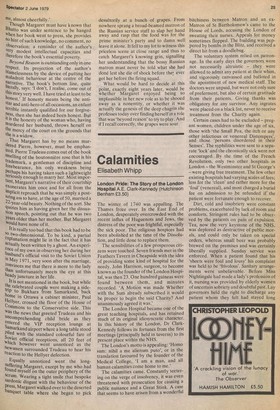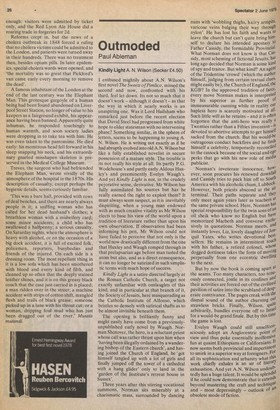Calamities
Elisabeth Whipp
London Pride: The Story of the London Hospital A. E. Clark-Kennedy (Hutchinson Benham £3.50)
The winter of 1740 was appalling. The Thames froze over. In the East End of London, desperately overcrowded with the recent influx of Huguenots and Jews, the distress of the poor was frightful, especially the sick poor. The religious hospices had been abolished at the time of the Dissolution, and little done to replace them.
The sensibilities of a few prosperous citizens were touched. Seven friends met in the Feathers Tavern in Cheapside with the idea of providing some kind of hospital for the needy. John Harrison, surgeon, to become known as the founder of the London Hospital, was then 23. One hundred guineas were found between them, and minutes recorded. 'A Motion was made Whether with the Sum already subscribed it would be proper to begin the said Charity? And unanimously agreed it was.'
The London Hospital became one of the great teaching hospitals, and has retained much of its original idiosyncratic character. In this history of the London, Dr ClarkKennedy follows its fortunes from the first meetings (principally held in taverns) to its present place within the NHS. The London's motto is appealing: 'Homo sum: nihil a me alienum puto', or in the translation favoured by the founder of the Medical College, 'I am a man, and all human calamities come home to me.'
The calamities came. Constantly teetering on the verge of insolvency, it was even threatened with prosecution for causing a public nuisance and a Great Stink. A case that seems to have arisen from a wonderful bitchiness between Matron and an exMatron of St Bartholomew's came to the House of Lords, accusing the London of sweating their nurses. Appeals for money sometimes flopped. The building was peppered by bombs in the Blitz, and received a direct hit from a doodlebug.
The voluntary system relied on patronage. In the early days the governors were not necessarily altruistic — they were allowed to admit any patient at their whim, and vigorously canvassed and balloted in the apointment of new medical staff. The doctors were unpaid, but were not only sure of preferment, but also of certain gratitude from their patients. Giving thanks was obligatory for any survivor. Any ingrates were placed on a black list, never to receive treatment from the Charity again.
Certain cases had to be excluded — pregant women, children under the age of six, those with 'the Small Pox, the itch or any other infectious or venereal Distempers', and those 'persons disordered in their Senses'. The syphilitics were sent to a separate 'lock' and the chronically sick were not encouraged. By the time of the French Revolution, only two other hospitals in London — the Westminster and St George's — were giving free treatment. The few other existing hospitals had varying scales of fees; less for the 'clean' and rather more for the 'foul' (venereal), and most charged a burial fee on admission to be refunded if the patient were fortunate enough to recover.
Dirt, cold and insobriety were constant problems, exacerbated by lack of room and comforts. Stringent rules had to be observed by the patients on pain of expulsion. Tea, now the very keystone of the NHS, was deplored as destructive of public morals, and could only be taken on special orders, whereas small beer was probably brewed on the premises and was certainly liberally supplied. Sunday service was enforced. When a patient found that his 'sheets were foul and lousy' his complaint was held to be 'frivolous'. Sanitary arrangements were unbelievable. Before Miss Nightingale had made a lady's profession of it, nursing was provided by elderly women of uncertain sobriety and doubtful past. Lay governors held the right to discharge any patient whom they felt had stayed long enough: visitors were admitted by ticket only, and the Red Lyon Ale House did a roaring trade in forgeries for 2d.
Reforms crept in, but the news of a cholera outbreak in 1848 forced a ruling that no cholera victims could be admitted to the London, and patients were turned away in their hundreds. There was no treatment then, besides opium pills. In later epidem ics, special cholera wards were opened, and 'the mortality was so great that Pickford's van came early every morning to remove the dead'.
A famous inhabitant of the London at the end of the last century was the Elephant Man. This grotesque gargoyle of a human being had been found abandoned on Liverpool Street Station, no longer of value to his keepers as a fairground exhibit, his appearance having been banned. Apparently quite inhuman, he responded touchingly to human warmth, and soon society ladies were dropping in to take tea with him. He was even taken to the pantomime. He died early: his monstrous head fell forward in his sleep snapping his neck, and his extraordinary gnarled misshapen skeleton is preserved in the Medical College Museum.
Treves, the surgeon who had befriended the Elephant Man, wrote vividly of the atmosphere of the hospital in the 1870s. His description of casualty, except perhaps the hygienic details, seems curiously familiar.
'This was a bare hall, provided with rows of deal benches, and there are nearly always people in it; a sniffing woman who has called for her dead husband's clothes; a breathless woman with a midwifery card; some minor accidents; a child who has swallowed a halfpenny; a serious casualty. On Saturday nights, when the atmosphere is heavy with alcohol, or on the occasion of a big dock accident, it is full of excited folk, policemen, reporters, busybodies and friends of the injured. On each side is a dressing room. The most repellant thing in it is a low sofa which has been smothered with blood and every kind of filth, and cleaned up so often that the deeply stained leather shines, and it is on this greasy black couch that the case just carried in is placed; a man ridden over in the street; a machine accident with strips of cotton shift, mangled flesh and trails of black grease; someone picked up in a lane with his throat cut; or a woman, dripping foul mud who has just been dragged out of the river.' Mutatis mutandi.







































 Previous page
Previous page